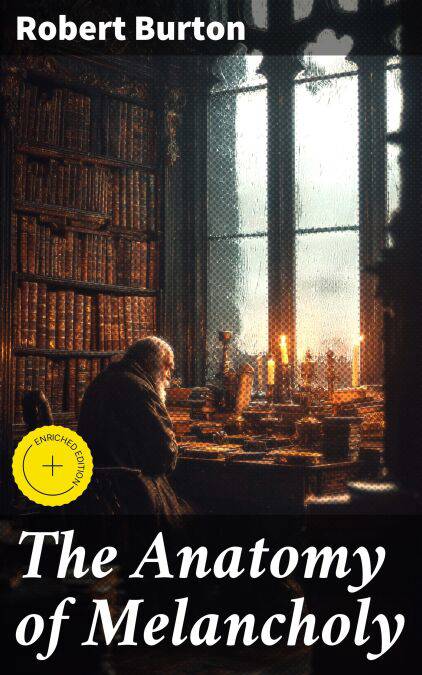
- Afhalen na 1 uur in een winkel met voorraad
- Gratis thuislevering in België vanaf € 30
- Ruim aanbod met 7 miljoen producten
- Afhalen na 1 uur in een winkel met voorraad
- Gratis thuislevering in België vanaf € 30
- Ruim aanbod met 7 miljoen producten
Zoeken
The Anatomy of Melancholy E-BOOK
Enriched edition. A Scholarly Exploration of 17th Century Melancholy and Its Remedies
Robert Burton
E-book | Engels
€ 1,99
+ 1 punten
Uitvoering
Omschrijving
In "The Anatomy of Melancholy," Robert Burton provides an unparalleled exploration of the human psyche, delving into the causes, symptoms, and remedies of melancholy'—a term that encompasses what we might now refer to as depression. Written in a unique blend of prose and verse, Burton's work is characterized by a rich tapestry of classical references, philosophical musings, and the latest medical knowledge of the 17th century. Its encyclopedic structure invites readers to meander through intricate arguments and digressions, reflecting the author's profound engagement with both human emotion and the intellectual currents of the Renaissance. Robert Burton was not only a scholar but also a clergyman who grappled with his own battles against melancholy, infusing his work with both scholarly rigor and heartfelt experience. His education at Oxford and deep engagement with a variety of texts and fields, including astrology, philosophy, and literature, informed his comprehensive approach to a subject that resonated with many of his contemporaries. Burton's personal struggles add a poignant layer to his examination, bridging the gap between intellectual inquiry and lived experience. This seminal work is essential for anyone seeking to understand the complexities of human emotion, making it a must-read for students of psychology, literature, and the humanities. Burton's insights remain remarkably relevant today, inviting readers to reflect upon their own emotional landscapes while offering a profound commentary on the universality of melancholy.
In this enriched edition, we have carefully created added value for your reading experience:
- A succinct Introduction situates the work's timeless appeal and themes.
- The Synopsis outlines the central plot, highlighting key developments without spoiling critical twists.
- A detailed Historical Context immerses you in the era's events and influences that shaped the writing.
- A thorough Analysis dissects symbols, motifs, and character arcs to unearth underlying meanings.
- Reflection questions prompt you to engage personally with the work's messages, connecting them to modern life.
- Hand‐picked Memorable Quotes shine a spotlight on moments of literary brilliance.
- Interactive footnotes clarify unusual references, historical allusions, and archaic phrases for an effortless, more informed read.
In this enriched edition, we have carefully created added value for your reading experience:
- A succinct Introduction situates the work's timeless appeal and themes.
- The Synopsis outlines the central plot, highlighting key developments without spoiling critical twists.
- A detailed Historical Context immerses you in the era's events and influences that shaped the writing.
- A thorough Analysis dissects symbols, motifs, and character arcs to unearth underlying meanings.
- Reflection questions prompt you to engage personally with the work's messages, connecting them to modern life.
- Hand‐picked Memorable Quotes shine a spotlight on moments of literary brilliance.
- Interactive footnotes clarify unusual references, historical allusions, and archaic phrases for an effortless, more informed read.
Specificaties
Betrokkenen
- Auteur(s):
- Uitgeverij:
Inhoud
- Aantal bladzijden:
- 1433
- Taal:
- Engels
Eigenschappen
- Productcode (EAN):
- 4057664170408
- Verschijningsdatum:
- 19/11/2019
- Uitvoering:
- E-book
- Beveiligd met:
- Digital watermarking
- Formaat:
- ePub

Alleen bij Standaard Boekhandel
+ 1 punten op je klantenkaart van Standaard Boekhandel
Beoordelingen
We publiceren alleen reviews die voldoen aan de voorwaarden voor reviews. Bekijk onze voorwaarden voor reviews.








